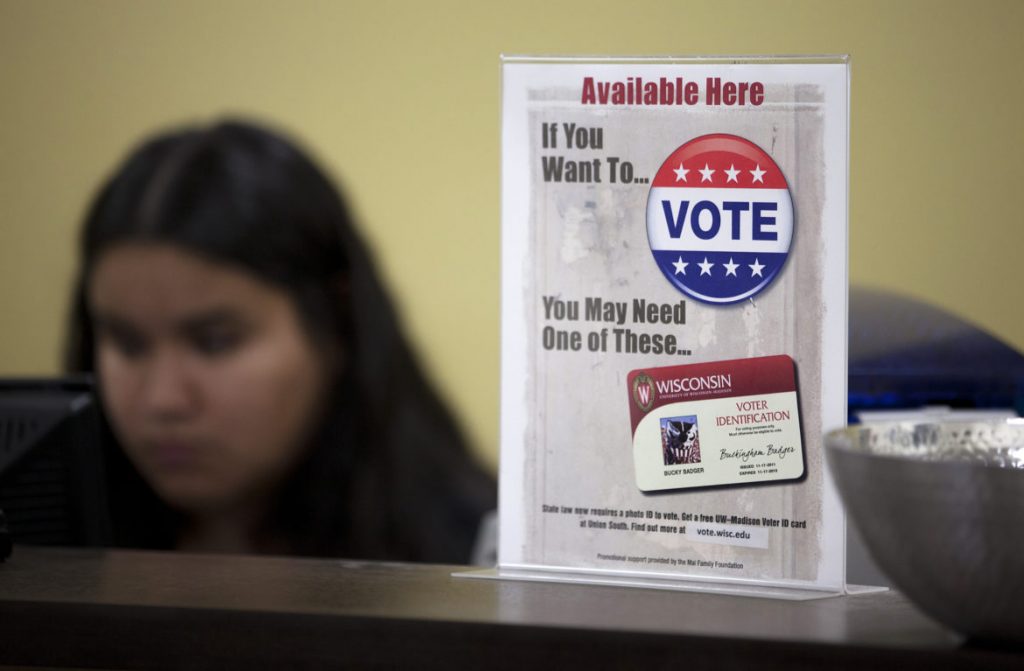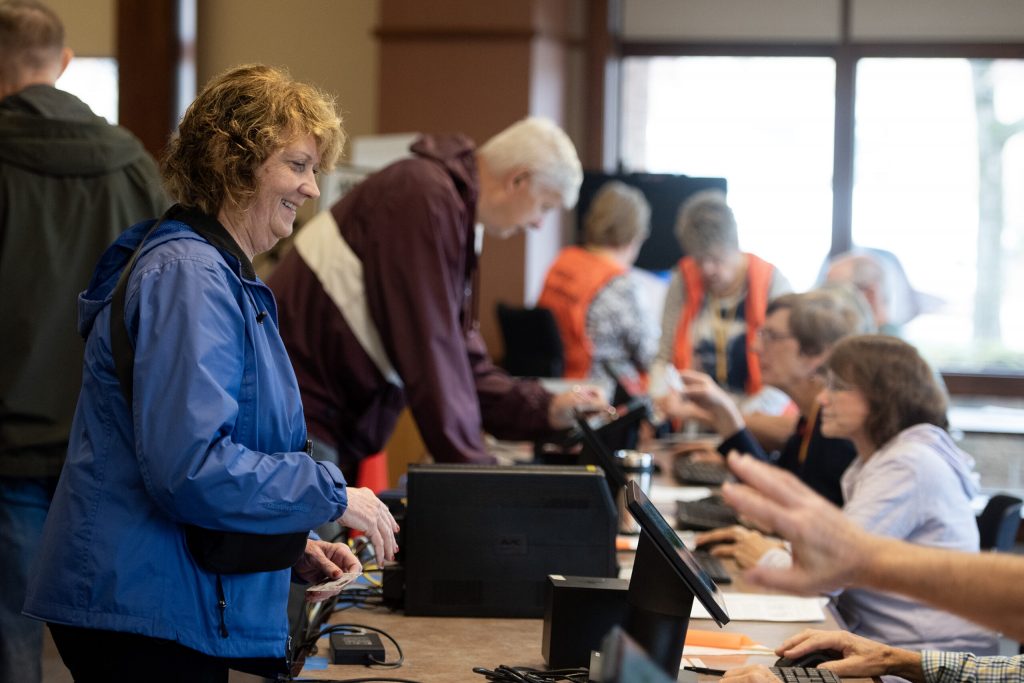GOP Lawmakers Move Quickly to Enshrine Wisconsin’s Voter ID Law
Early committee hearing to put a proposed constitutional amendment on the April ballot.

A sign at Union South at the University of Wisconsin-Madison lets students know they may need additional identification to vote in Wisconsin beyond their regular student ID. UW System campuses are offering free specialized voter ID cards, but students will need to also bring proof of enrollment to the polls. Coburn Dukehart/Wisconsin Watch
Wisconsin lawmakers held a public hearing on a proposal to enshrine Wisconsin’s existing voter ID law into the state constitution on Tuesday, the first step toward passing it through the Legislature and eventually bringing it before voters.
Republicans on the Senate Judiciary Committee then approved the proposal, against Democratic opposition, setting the stage for the Legislature as a whole to vote on it — which could happen as early as this week.
“If we wait on something like this, then (the court) could rule that the photo ID is unconstitutional, and then it would be a harder time,” said Rep. Patrick Snyder, R-Weston, the bill’s co-author. “This gives the electorate the opportunity to make that decision.”
The GOP-authored proposal, which would render permanent a state law requiring a voter to show photographic proof of identity before casting a ballot, already passed the Legislature last session. If it passes a second time, it will go before voters, bypassing any opportunity for Gov. Tony Evers to veto it.
If that second passage happens quickly enough, it could go before voters as soon as April, on the same ballot as a high-profile Wisconsin Supreme Court race. Republicans have argued that enshrining the law in the state constitution would make it difficult for the high court, which currently has a liberal majority, to do away with the law.
Making voter ID a constitutional requirement, rather than an act of the Legislature, would also make it all but impossible for Democrats to overturn the requirement if they win majorities in the Legislature in the future.
At Tuesday’s hearing, Democrats immediately accused their Republican colleagues of playing politics by calling the committee hearing with little notice, just one day after the 2025 legislative session began.
“Why are we here, at 9:00 in the morning, the day after we were sworn in?” asked Sen. LaTonya Johnson, D-Milwaukee.
She argued that Republicans were prioritizing the wrong issues as part of a power grab.
“If we are setting the tone that this is our priority … then that’s an issue,” she added.
“This is up today because it’s ready to go,” Wanggaard said.
Sen. Kelda Roys, D-Madison, argued that voter ID in general makes it harder for ordinary people to vote.
“I think when you gloss over the actual problems that real people have just because you didn’t experience it, I think that’s evidence of very lazy policy making,” she said. “We are here to make policy for every person in the state.”
Wanggard argued that having the right to vote “doesn’t lessen your responsibility.”
“You gotta participate. You gotta be a participant,” he said. “But I don’t think there’s anything wrong with saying that (you have to) have something to identify who you are and that you’re really that person and that you’re eligible to vote.”
The Senate is scheduled to vote on the proposal on Wednesday, and the Assembly is scheduled to have its own committee hearing on the proposal that same day, before they are scheduled to vote on it on Jan. 14.

A voter checks in before receiving a ballot Tuesday, Nov. 5, 2024, in New Berlin, Wis. Angela Major/WPR
Existing voter ID law faced years of challenges
The proposed constitutional amendment passed the Legislature once before, on pure party lines, but the law it would make permanent has been controversial since it was enacted under Gov. Scott Walker in 2011. After a host of lawsuits, it was ultimately upheld in both state and federal court.
While a conservative majority on the state Supreme Court ruled in favor of Wisconsin’s voter ID law in 2014, Wanggaard argued the liberal majority on the current court could inspire a new lawsuit.
That race pits Brad Schimel, a Waukesha County judge and former Republican attorney general, against Susan Crawford, a Dane County judge who formerly represented Democrats and Planned Parenthood as an attorney. Both are running to fill a seat that will be vacated after Justice Ann Walsh Bradley, a liberal, retires.
On Tuesday, critics of the voter identification laws argued they raise a hurdle to voting, and that some communities — including people of color, low-income people, urban dwellers and students — are less likely to have access to required forms of identification.
Lisa Hassenstab, the public policy manager at Disability Rights Wisconsin, argued that people with disabilities can struggle to obtain photo ID.
“A number of Wisconsin residents who have a disability don’t drive, they don’t have a driver’s license, they may not have other photo ID required to vote,” she said. “Positioning the DMV as the primary place for Wisconsinites to get a photo ID increases barriers for a number of people.”
As written, the proposed constitutional amendment would allow the Legislature to create exceptions to the requirement, and voters without proper identification could still cast provisional ballots, although they would have to present an ID later in order to make those votes official.
GOP lawmakers move quickly on effort to enshrine Wisconsin’s voter ID law was originally published by Wisconsin Public Radio.
If you think stories like this are important, become a member of Urban Milwaukee and help support real, independent journalism. Plus you get some cool added benefits.






















this is such a stupid law.
I was once questioned because my picture didn’t have glasses – I used my passport that day – and I was wearing glasses.
I also have been slowed down when I used my passport because it doesn’t have an address. I usually just say, “but this proves I am a citizen.” That works.
Of course, a passport doesn’t prove I live in that voting district does it! No address
I have since taken pity on the poor election workers. They are going thru enough.
Republicans lust for power is manipulative. An Amendments purpose is to fix injustice.
Vote in 2026 Midterm Elections. They won’t hold the majority with Fair Maps in place.
Passports can only be used to confirm identity when voting. They are not acceptable when registering to vote, when other documentation is needed to prove residency.
Proving citizenship (should it ever be required for voter registration) is a real challenge. Not everyone has a passport or notarized birth certificate. There are people who don’t know where they were born, and birth records (usually maintained at the county level) are can be lost or destroyed. Presumably naturalized citizens guard their papers carefully, so ironically any citizenship testing would be easier for them than natural born citizens.
The way these constitutional amendments have been used the past few years is shameful and wasteful. Almost always in a primary when nobody votes. Another example of the minority deciding for the majority.